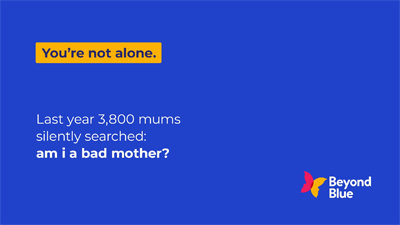Dr Grant Blashki Dear Dr Google Interview

Dear Dr Google… Am I A Bad Mother?
Each year thousands of parents experience depression and anxiety related to the birth of their baby, but many don't realise they may have a mental health condition.
A new Beyond Blue analysis has found many parents are reluctant to have an open conversation about their feelings and instead seek answers online to questions they're too afraid to ask aloud.
Both women and men can experience perinatal depression and anxiety, with risks increasing during pregnancy and the 12 months following birth.
Each year one in ten women will experience depression during pregnancy, one in six women will experience postnatal depression and anxiety – and one in ten fathers will experience postnatal depression.
Beyond Blue analysed current global Google data for terms that may indicate signs of anxiety and depression during the perinatal period.
"I don't love my baby" was searched 3,840 times last year
"Am I a bad mother?" was searched 3,800 times last year
"I hate being pregnant" was searched 15,600 times last year
"Does my baby love me?" was searched 4,680 times last year
"I feel alone in my pregnancy" was searched 2,040 times last year
Beyond Blue Clinical Adviser Dr Grant Blashki said many new parents may not recognise that they are experiencing perinatal anxiety or depression, or that there is help available.
"Many parents navigate the journey alone, believing symptoms are just part of being a new parent, but it's important to recognise when feelings affect day-to-day life," Dr Blashki said.
"Modern mums and dads are also up against a type of stressor related to social media: the pressure to be the perfect parent, which often paints a false and highly selective representation of what parents should experience day-to-day.
"Seeking and accepting help is critical for parents, however the first step in doing so is recognising the signs of depression and anxiety.
"We're encouraging new mums to complete the Mum's Mental Health Checklist – a set of 10 questions designed to give new and expectant mothers, and their health professionals, an insight into how they're coping.
"The checklist is a simple first step towards getting the appropriate support for their needs."
Beyond Blue has launched its new Perinatal Depression and Anxiety (PNDA) campaign, Strength in Numbers.
The new campaign works to identify, educate and support mums and dads who experience anxiety and depression during this period – while emphasising that they are not alone and that help is available.
To find out more, visit healthyfamilies.beyondblue.org.au or access the Mental Health Checklist for Mums.
Interview with Dr Grant Blashki, Beyond Blue Lead Clinical Adviser
Question: What motivated Beyond Blue to analyse the questions new parents ask Google?
Dr Grant Blashki: At Beyond Blue we know busy mums and dads can struggle to find time to look after their own wellbeing and Googling questions about their own feelings is a common way for parents to seek answers. By analysing this data, we can see what common trends are emerging in parents' thinking which informs the work we do.
Question: Are you surprised that "Am I a bad mother?" was searched 3,800 times last year?
Dr Grant Blashki: Sadly, no. It's common for people, especially in this social media age, to constantly compare themselves to others and to feel inadequate. This includes mums and dads comparing themselves to other parents and their carefully curated social media profiles. No one is perfect and many mums feel the same way.
Question: How do these frequently Googled questions show signs of depression and anxiety?
Dr Grant Blashki: While someone searching these questions doesn't necessarily have depression or anxiety, it may indicate a low mood and feelings of isolation. I encourage mums and dads to visit healthyfamilies.beyondblue.org.au or access the Mental Health Checklist for Mums.
Question: What other symptoms should friends and families look for in new parents?
Dr Grant Blashki: Families and friends can help new mums and dads by looking out for changes in their behaviour, how they say they're feeling and what they're thinking about. Some signs a new parent might not be doing so well are if they become withdrawn, say they're feeling overwhelmed, talk about being worthless or say things like 'I'm a failure'. Depression and anxiety look and feel different for everyone, but if you're concerned you can check out the Beyond Blue website for tips on how to have the conversation with someone.
Question: How has social media increased the rates of perinatal depression and anxiety?
Dr Grant Blashki: Modern mums and dads are up against a type of stressor related to social media: the pressure to be the perfect parent, which often paints a false and highly selective representation of what parents should experience day-to-day. For some people this might contribute to feelings of inadequacy as a parent. There are also good aspects to social media, it can help people to stay connected and link people in to groups of new parents going through shared experiences.
 Question: How do the symptoms for perinatal depression in men and women differ?
Question: How do the symptoms for perinatal depression in men and women differ? Dr Grant Blashki: There is not a characteristic male or female pattern to experiencing depression with every individual having their own pattern of thoughts feelings and behaviours that characterise their depressive experience. A difference which is concerning is that 45% of fathers are not aware that men can experience postnatal depression as well as women.
Question: Can you tell us about Strength in Numbers?
Dr Grant Blashki: The common questions which emerged from the analysis of Google searches are used in our new Strength in Numbers perinatal depression and anxiety campaign. The questions will appear in social media tiles which also remind people they are not alone and link through to the mental health checklist for mums on our website. The campaign aims to identify, educate and support mums and dads who experience these feelings, while emphasising that they are not alone and that help is available.
Question: What are the treatment options?
Dr Grant Blashki: Treatments for depression and anxiety depend on the person and the severity of their symptoms, your GP is a really great place to start with getting support. Treatments can include medication, psychological methods like talking therapies and mindfulness, or a combination of therapies.
MORE
- Dr Linda Swan World Health Day: Depression:...
- Helping To Change Perception Of Suicide And...
- Am I Worried, or is this Anxiety?
- Jack Heath Depression in Australian Workplaces...
- The Importance Of Getting Help For Your Fears...
- Managing Your Fearful And Obsessive Thoughts
- Ending Your Life Is Not The Answer To Your...
- When Your Friends Do Not Understand Your Mental...
- How To Find A Good Mental Health Counselor
- Exercise Effective Remedy For Depression
- Addicted To Being Busy



